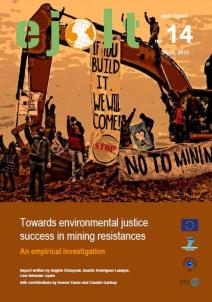
EJOLT Report 14: Towards environmental justice success in mining resistances: An empirical investigation
The report can be downloaded here
Abstract
This report sets out to provide evidence-based support for successful environmental justice (EJ) activism and assess the constituents and outcomes of contemporary socio-environmental mining conflicts by applying a collaborative statistical approach to the political ecology of mining resistances. The empirical evidence covers 346 mining cases from around the world, featured on the EJOLT website as The EJOLT Atlas of Environmental Justice, and is enriched by an interactive discussion of results with activists and experts. In an effort to understand both the general patterns identified in conflicts at hand, and the factors that determine EJ ‘success’ and ‘failure’ from an activist viewpoint, the experiences of EJOs that pursue EJ in mining conflicts are analysed by combining qualitative and quantitative methods.
The report employs, first, social network analysis to study the nature of the relationships both among corporations involved in the mining activity, on the one hand, and among EJOs resisting against the mining project, on the other. Both sets of conditions and cooperation are then compared to discuss ways to develop a more resilient activist network that can trigger social change and achieve EJ success. Then, multivariate analysis methods are used to examine the defining factors in achieving EJ success and to answer the following research questions: In which case a conflict is more intense? What makes EJ served? When is a disruptive project stopped? Finally, qualitative analysis, based on descriptive statistics, is conducted to investigate factors that configure the perception of success for EJ and incorporate activist knowledge into the theory of EJ. A thorough analysis of the answers given to question “Do you consider the case as an accomplishment for the EJ?” with their respective justifications help us to understand why the resistance movements consider a particular result as an EJ success or failure in the context of a mining conflict.
Overall, such analytical exercises, coproduced with activists, should be seen as a source of engaged knowledge creation, which is increasingly being recognised as a pertinent method to inform scientific debate with policy implications. We hope that the findings of this report, which brings past experiences on mining conflicts together, will be insightful and relevant for EJOs. The results and policy recommendations are open to further testing, whenever a better evidence base becomes available.
Report written by Begüm Özkaynak, Beatriz Rodríguez-Labajos, Cem İskender Aydın

The project ENVJUSTICE has received funding from the European Research Council (ERC) under the European Union’s Horizon 2020 research and innovation programme (grant agreement No. 695446)